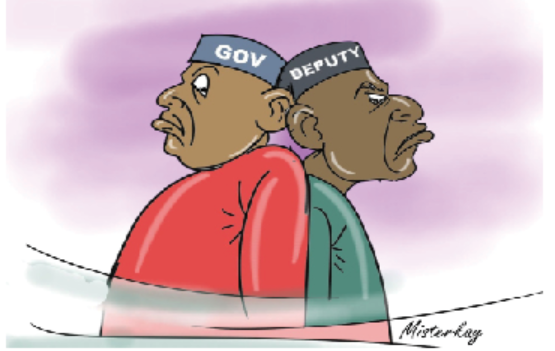Although the law provides for a joint ticket, their affiliation is often mired in lack of trust
The ongoing strife between Governor Godwin Obaseki and his deputy, Philips Shaibu, in Edo State, as well as Governor Rotimi Akeredolu and his deputy, Lucky Aiyedatiwa, in Ondo State have, for yet another time, accentuated the need for an in-depth assessment of the relationship between governors and deputies.
Three days ago, the embattled deputy governor of Edo State was denied access to his office in the Edo Government House, clearly on the orders of Governor Godwin Obaseki, with whom he has been having a very frosty relationship of late.
The picture of Shaibu standing in front of the locked gate to his office has continued to trend on the social media before and after making it to the front page of some national dailies, including LEADERSHIP.
Before the incident, there were reports that the deputy governor’s office had been moved to a location outside the Government House, still on the directive of Governor Obaseki. But Shaibu was quoted as saying that he had not been officially communicated about the relocation.
Even before the relocation drama which culminated in denying the deputy governor access to his office in the Government House, Governor Obaseki had disbanded his deputy’s media team.
Of course, the disagreement between Obaseki and Shaibu, two intimate friends-turned-foes, is essentially a succession battle and has been going on for months now. At the heart of this feud is the struggle for the soul of Edo State post-Obaseki era. Expectedly, as the feud continues to get messier, it is having a telling effect on governance in the state.
Just as one struggles to digest the Obaseki/Shaibu feud, Governor Rotimi Akeredolu and his deputy, Lucky Aiyedatiwa, are enmeshed in a squabble that has further deepened the mutual distrust among them and their respective followers in Ondo State.
Defying all efforts to cover up, the feud between Akeredolu and Aiyedatiwa became more pronounced when, on arrival from his sick leave, the Ondo governor sacked his deputy’s media aides.
Recurring governor-deputy feud
The quarrel between governors and deputies is not peculiar to Edo and Ondo States. There are copious instances of such scuffle from the dawn of the current democratic dispensation in 1999 to date. Recall that President Bola Ahmed Tinubu, as governor of Lagos State, had a very frosty relationship with his deputy, Sen Koforowola Akerele-Bucknor, leading to her eventual resignation in 2002 before the 2003 general polls, in the face of an imminent impeachment. In Sokoto, there was the feud between then Governor Attahiru Bafarawa and his deputy, Aliyu Magatakarda Wammako. Governor Rochas Okorocha had a similar scuffle with his deputy, Eze Madumere, in Imo culminating in his controversial impeachment which was eventually overturned by the court. In Kogi, Governor Yahaya Bello fought his estranged deputy, Simon Achuba, who was eventually impeached, and like Madumere, a court of competent jurisdiction nullified his impeachment. The list is long.
More often than not, the relationship between a governor and his deputy, especially the governors serving out their second and final term, is riddled with distrust and mutual suspicion.
Although the law provides for a joint ticket, their affiliation is often mired in lack of trust characterized by little or no delegation of authority, and near absence of power sharing. What obtains is a situation where the deputies are often relegated and confined in political oblivion. It is very common to see the secretary to the state government, or even a favoured commissioner, wielding more power than the deputy governor.
There is no repeating the fact that the constitution arrogates enormous power to the governors. Unfortunately, in my view, the constitution failed to provide a clearly defined role for the deputy governor, and because the balance of power is skewed to the deputy governor’s disadvantage, the deputies face humiliation whenever there are instances of feud like we are currently witnessing in Edo and Ondo states.
Constitutional roles for deputy governor
As far as the 1999 Constitution is concerned, the role of a deputy governor is at the governor’s discretion. Oftentimes, some governors limit their deputies to attending events which the governors could not attend. Worse still, there are copious instances where governors travel out of the country without handing over to their deputies, not minding the implication of such action on governance in the state.
It is clear that in constituting themselves as emperors of some sort, some governors are abusing the enormous power arrogated to them by the constitution. Fundamentally, there is the need to amend the constitution to ensure deputy governors are accorded clearly defined roles beyond the provisions made in sections 191(1) and 193 (1) of the 1999 Constitution as amended.
Whereas section 191 (1) states, inter alia, that “the Deputy Governor of a State shall hold the office of Governor of the State if the office of Governor becomes vacant by reason of death, resignation, impeachment, permanent incapacity or removal of the governor from office for any other reason in accordance with Section 188 or 189 of this constitution, ” section 193 (1) stipulates that “the Governor of a State may, in his discretion, assign to the Deputy Governor or any Commissioner of the Government of the State responsibility for any business of the Government of that State, including the administration of any department of Government.”
I find it hard to explain why, despite providing for a joint ticket, the constitution is silent on providing a clearly defined role for the deputy governor. This, perhaps, is the costly mistake that has been fueling the needless friction between governors and their deputies, thereby clogging the wheels of governance.





